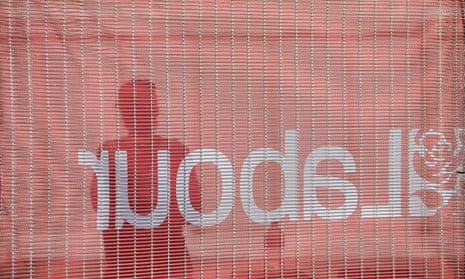I had a conversation last week with a Jewish woman from a family of Holocaust survivors, and people murdered by the Nazis. She has been a Labour party member for nearly 40 years. “It feels like being in an abusive relationship,” she said. A year ago she made an official complaint to the party about what she has experienced, but aside from an acknowledgment, she has heard nothing. During debates in her constituency general committee about issues of antisemitism, she has been jeered – by as many as 30 people – for trying to point out the gravity of the issue. At one party event about hate speech, she was prevented from speaking. Some of her supposed comrades have said that claims of antisemitism have been invented to undermine Jeremy Corbyn; she knows of at least one suggestion that such accusations are the work of Israel.
She told me that the people responsible seem to fall into two broad groups: a belligerent and relentless hard core including a few people who seem to be “attracted to conspiracy theories”, and an element who seem much less zealous, but are “swept up by a kind of tribalism”. “A lot of my Jewish friends have left Labour,” she told me. “I feel that I have to stay and fight. But I’m on the brink.”
Contrary to most of the political noise over the past week, the wider story of which she is one small part is not fundamentally to do with Labour’s disciplinary procedures or any conflict at the top, but deep questions about the party’s current culture. Just watch the video that eventually led to Derby North MP Chris Williamson being suspended from the party, and consider not what he said about Labour’s approach to antisemitism (“We’ve given too much ground – we’ve been too apologetic”), but the loud applause that followed.
What surely brought his audience to a draughty-looking meeting room was a shared belief in equality and solidarity, and the urgent need to revive the country they live in. If confronted with the term “antisemitism”, they would doubtless recoil. But like the defiant, ugly motions passed recently by a handful of constituency parties in response to Williamson’s suspension, their clapping symbolises something that needs to be talked about.
One Jewish Labour activist I spoke to last week characterised what appears to have taken hold of the party as a “virus”: something that goes far beyond the outbursts and pronouncements of an array of high-profile people and the filth regularly put up on social media (witness what was tweeted by party members and published last week by Tom Watson, about Jewish people’s “double-dealing, back-stabbing, cheating chilling coldness” and “hearts and brains totally devoid of humanity”). It is too wide-ranging to be written off as something confined to “fringe” elements, and present at the very top. The whole thing is a case study in how racism works, and the fact that if people constantly deny something, they can easily end up in dangerous moral proximity to it.
Those in charge of the party continue to insist that the problem will somehow be “rooted out”, but the fact that they still seem to be dragging their feet rather undermines such talk, which also ignores two questions that still cry out for an answer. Why do people with antisemitic views think today’s Labour party is the right place for them? And why are so many people on the left still averting their eyes? The exit from the party of the Liverpool MP Luciana Berger is a case in point, bluntly summed up by the leftwing Jewish journalist Rachel Shabi: “A Jewish MP left Labour because of the tide of antisemitism directed at her and I don’t think the terrible significance of this has sunk in for chunks of the left.”
Thanks chiefly to the internet, we live in a time of rampant, ubiquitous conspiracy theory, tangled up in classically antisemitic cliches about sinister cabals and supposed secret plots. By coincidence, the fallout from the financial crash of 2007-8 has created the perfect context for this mushrooming of collective paranoia and fantasy, and politics has been transformed across the world. At the heart of the various strands of populism that have taken root in many countries over the past five years, you will find not just a supposed divide between “the people” and an elite, but a deep conviction that the latter is mired in corruption and globe-spanning skulduggery that is never made public.
Since the embrace of its own form of populism in the wake of the 2016 referendum, the Labour party has imbibed some of the same stuff. It now tends to present the very real failings of modern capitalism not as a matter of anything systemic, but the work of a small group of people who are ruining things for the rest: what Corbyn calls a “self-serving elite”, who “monopolise the wealth that should be shared by each and every one of us”. Threaded through all this is the idea of the party leader as a humble, completely virtuous man, battling those cabals even as they dispense endless lies and “smears” and encourage his adversaries.
Corbyn’s lifelong interest in Israel-Palestine, and his associations with – and I’m being polite here – some of that conflict’s more controversial elements, have played a part in pushing this narrative somewhere grim. He himself has talked in the past about “the hand of Israel” subtly and secretly acting from a distance. And from there it is only a short hop to two ideas which seem to have spread from a small hard core rooted in the anti-imperialist far left out into the wider party. First, that Israel – and by extension Jewish people – must have something do with many of the “smears”. And second, that accusations of antisemitism usually have a concealed agenda.
Three years ago I glimpsed an early augury of all this when, at an event in Liverpool, I was collared by one party member about a negative take on Corbyn and Corbynism that had recently been written by a Jewish colleague. Whatever his ostensible issues with the direction Labour was moving in, she insisted, his views were down to only one thing, which she said with real venom: “It’s because he’s a Zionist.”
A few days ago I spoke to another Jewish Labour member, who talked about a sundered bond between the party and British Jews, and how Labour had once nurtured a precious Jewish political tradition that was now close to breathing its last. “We’re at the stage where it’s like the Labour party has forgotten its own history,” he said. I wondered: where did he think the party could go from here? “To think about it is too depressing,” he said. “As Jewish members, we just concentrate on what we can do in the next few days, or weeks.”
And what was that? “I don’t know,” he said. “I don’t know.” This answer was unbelievably sad, and replete with a sense of huge political failure. That Labour has a duty to try to repair massive damage is self-evident, but so too is something whole swathes of the party have yet to absorb. This awful tragedy demands not just immediate action, but a cultural transformation, which ought to begin with something I always thought people on the left understood as a matter of instinct: that when faced with bigotry, you listen not to voices of denial and doubt, but to the people on the receiving end of it.

